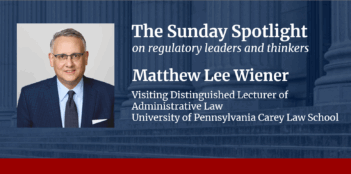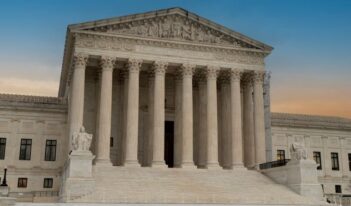
Commentators highlight the ramifications of the Court’s most significant regulatory cases.
Over its most recent term, the U.S. Supreme Court has heard some of the most closely watched cases related to administrative law and regulation in recent memory. The Court has decided issues addressing a wide variety of topics including endangered species protection, the nondelegation doctrine, agency deference, and federal preemption.
This term represents the beginning of a new era for the Court, following Justice Anthony Kennedy’s retirement and Justice Brett Kavanaugh’s elevation. Many observers have watched the Court closely to see whether the composition of the Court will change dramatically the direction of the law, particularly with respect to the future of the administrative state.
The Regulatory Review has invited leading scholars and practitioners from across the country to weigh in on the impacts of the Court’s regulatory decisions from this past term.
The contributors for this series include: Ronald A. Cass, Dean Emeritus of Boston University School of Law; Holly Doremus, a professor at the University of California, Berkeley, School of Law; Kristin E. Hickman, a professor at the University of Minnesota Law School; Herbert Hovenkamp, a professor at the University of Pennsylvania Law School; Sarah Paoletti, a professor at the University of Pennsylvania Law School; Gordon Todd, a partner at Sidley Austin LLP; Andrew N. Vollmer, a senior affiliated scholar with the Mercatus Center at George Mason University; Daniel Walters, a professor at Pennsylvania State University School of Law; and Adam Zimmerman, a professor at Loyola Law School, Los Angeles.
Gundy, Nondelegation, and Never-Ending Hope
July 08, 2019 | Kristin E. Hickman, University of Minnesota Law School
Contrary to the wishes of some, the Court in Gundy—yet again—upheld a statute against a nondelegation challenge. Yet again, however, the justices offered hope to those who wish the Court would apply the doctrine with more (or really any) rigor.
A Turning Point in the Deference Wars
July 09, 2019 | Daniel E. Walters, Pennsylvania State University School of Law
Although momentum had been building to overturn a controversial form of deference to agency legal interpretation known as Auer deference, the Court in Kisor v. Wilkie instead took the opportunity to synthesize and consolidate core administrative law doctrines.
Deference After Kisor
July 10, 2019 | Ronald A. Cass, Boston University and George Mason University
The five-justice majority in Kisor chose not to overrule Auer. But after Kisor, directions for judicial review of agency own-rule interpretation bear scant resemblance to Auer deference.
A Missed Opportunity in Securities Fraud Enforcement
July 11, 2019 | Andrew N. Vollmer, George Mason University
In Lorenzo v. Securities and Exchange Commission, the U.S. Supreme Court continued the struggle between plaintiffs and defendants in fraud cases under federal securities laws. Although the Court tacked back toward the plaintiff’s side, the decision resolved little of the confusion between primary and aiding-and-abetting liability.
The Sound of Silence
July 12, 2019 | Gordon D. Todd, Sidley Austin LLP
The 3-3-3 split generated by Virginia Uranium v. Warren has attracted less attention than its more high-profile cousins. But the case’s tripartite resolution will have broader implications.
The Supreme Court Holds the Line on Truth over Pretext
July 15, 2019 | Sarah Paoletti, University of Pennsylvania Law School
In Department of Commerce v. New York, the U.S. Supreme Court seemed to put an end to the Trump Administration’s quest to include a citizenship question in the 2020 census. But the political firestorm has continued.
Endangered Deference
July 16, 2019 | Holly Doremus, University of California, Berkeley, School of Law
In Weyerhaeuser v. U.S. Fish and Wildlife Service, the Court indicated that it is not inclined to defer to agency expertise. The decision is likely to complicate future implementation of at least the Endangered Species Act and may further entrench the power of cost-benefit analysis in other areas of regulation, too.
Fixing Antitrust’s Indirect Purchaser Rule
July 17, 2019 | Herbert Hovenkamp, University of Pennsylvania Law School
Apple v. Pepper ruled that consumers who claim to have overpaid for apps sold on Apple’s App Store could sue Apple for damages. This ruling rejected a view expressed by the dissenters that harkens back to a nineteenth century tort law concept that was properly abandoned in tort cases and makes even less sense in antitrust cases.
Regulating Safety after Merck v. Albrecht
July 18, 2019 | Adam Zimmerman, Loyola Law School, Los Angeles
In Merck v. Albright, the Court settled a narrow procedural question but the decision showcases that, in the near future, federal preemption questions will turn on unusual coalitions of justices with different views about regulatory expertise, the value of civil litigation, and federal power.



